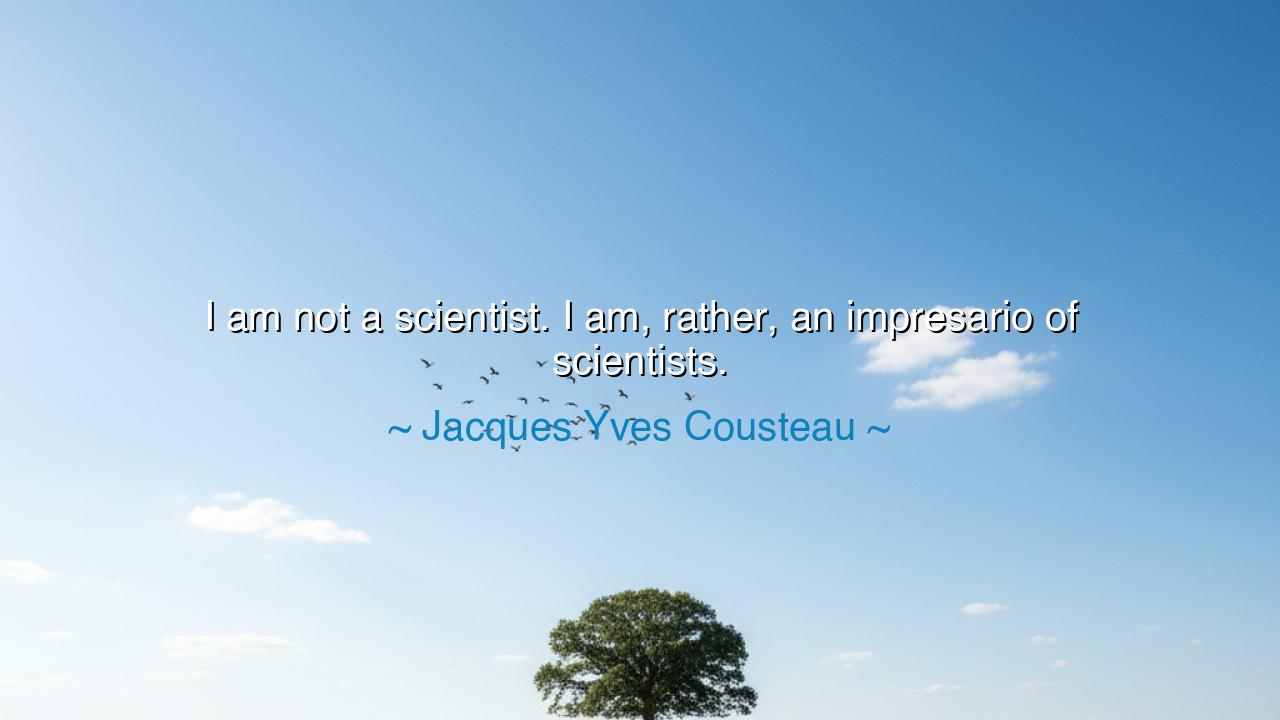
I am not a scientist. I am, rather, an impresario of scientists.






“I am not a scientist. I am, rather, an impresario of scientists.” Thus declared Jacques Yves Cousteau, the great mariner of the deep, who brought the hidden worlds of the ocean before the eyes of men. In these words, Cousteau reveals the truth of his vocation: he did not claim to be the one who devised every formula, nor the one who built every instrument, but the one who gathered the dreamers, the thinkers, the divers, and the inventors, and brought their works into harmony. Like the conductor of an orchestra, he was not each instrument, but the one who gave them voice together.
The origin of this saying lies in the nature of Cousteau’s work. He did not dwell only in laboratories, nor was his genius confined to narrow specialization. His vision was broad, his spirit restless. He invented the Aqua-Lung, opened the world of scuba to all, and created films that inspired generations to love the seas. But his true gift was not just invention, it was leadership. He drew around him engineers, biologists, sailors, and explorers, and united them in a common quest: to unveil the mysteries of the oceans. Thus he named himself not a scientist, but an impresario, the one who organizes and magnifies the voices of others.
History has known many such figures. Consider Prince Henry the Navigator of Portugal, who in the 15th century gathered cartographers, shipbuilders, and sailors. He himself was not the one to set sail across the oceans, but his vision and patronage set into motion the Age of Exploration. In like manner, Cousteau guided others into the depths, turning scattered knowledge into a symphony of discovery. It is a reminder that progress often depends not only on individual genius, but on the harmonization of many.
The meaning of Cousteau’s words also speaks to humility. In an age when men hunger to be seen as singular geniuses, Cousteau declared that his greatness lay in enabling others. To be an impresario of scientists is to recognize that the work of discovery is not solitary but communal. It is to rejoice not in taking all the credit, but in amplifying the gifts of others, ensuring that their findings reach the ears of the world. This is no lesser calling—it is a noble one, for through it, the discoveries of the few become the inheritance of the many.
Yet there is also something heroic in these words. For the impresario is not passive; he is the one who gathers, organizes, inspires. Without Cousteau, the inventors of diving gear might have remained obscure, the researchers of marine biology unheard, the ocean itself unseen by the common man. He transformed science into spectacle, without diminishing its truth. He made the hidden visible, and by doing so, awakened a generation to the fragile beauty of the seas.
The ancients too spoke of such roles. Plato praised the philosopher-king who, though not master of every craft, knew how to guide the craftsmen toward the good. In the East, sages taught that the leader is not the strongest warrior but the one who unites the people. Cousteau’s declaration belongs to this lineage: to be great is not always to be the one with the deepest knowledge, but the one with the broadest vision, who knows how to summon knowledge into light.
So, O listener, take this lesson: do not despise the role of the impresario, nor believe that greatness lies only in solitary genius. Perhaps your task is not to discover every truth, but to gather those who can. Perhaps your calling is to be the bridge between the seekers and the world, the one who amplifies, organizes, and inspires. For Cousteau teaches us this eternal wisdom: that discovery is a chorus, not a solo, and that sometimes the greatest gift is to be the one who conducts the music of many into a song that awakens the world.






AAdministratorAdministrator
Welcome, honored guests. Please leave a comment, we will respond soon